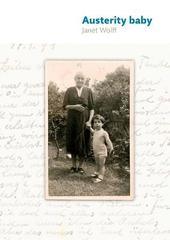
|
Austerity Baby
Paperback / softback
Main Details
| Title |
Austerity Baby
|
| Authors and Contributors |
By (author) Janet Wolff
|
| Physical Properties |
| Format:Paperback / softback | | Pages:272 | | Dimensions(mm): Height 240,Width 170 |
|
| Category/Genre | Memoirs
Intergenerational relationships
Local history
Family history and tracing ancestors |
|---|
| ISBN/Barcode |
9781526121301
|
| Classifications | Dewey:929.2 |
|---|
| Audience | |
|---|
| Illustrations |
199 colour illustrations
|
|
Publishing Details |
| Publisher |
Manchester University Press
|
| Imprint |
Manchester University Press
|
| Publication Date |
22 June 2017 |
| Publication Country |
United Kingdom
|
Description
Austerity Baby might best be described as an 'oblique memoir'. Janet Wolff's fascinating volume is a family history - but one that is digressive and consistently surprising. The central underlying and repeated themes of the book are exile and displacement; lives (and deaths) during the Third Reich; mother-daughter and sibling relationships; the gen
Author Biography
Janet Wolff is Professor Emerita in the School of Arts, Languages and Cultures at the University of Manchester. She is a renowned art historian and writer. -- .
Reviews'Janet Wolff 's book is formed out of ten essays rather than chapters. Each has its own beautiful shape leading the reader from its opening gambit through a wandering exploration of unexpected elements associationally rather than logically linked to an often unexpectedly elegant reconnection with the starting point.' Griselda Pollock, University of Leeds, New Formations 'Ultimately, this is "a story about exile, travel and belonging" penned by a self-styled "third-generation alien", both troubled by and proud of that status.' Monica Bohm-Duchen, Jewish Renaissance.org.uk, October 2017 '[Janet Wollf's] memoir is formatted in the manner of a textbook/scrapbook; she guides her reader through a series of seemingly incongruous documents, paintings and diary extracts in the manner of a scholarly aunt turning the pages over your shoulder (possibly over a large lunch). Despite the thorniness of issues like memorialisation and racial identity, there is a certain languor in Wolff's movement from topic to topic. And for all its obliqueness, it is Wolff's warm tone that unifies the sometimes spuriously related stories, and makes the memoir so engaging.' Clara Collingwood, Jewish Quarterly -- .
|